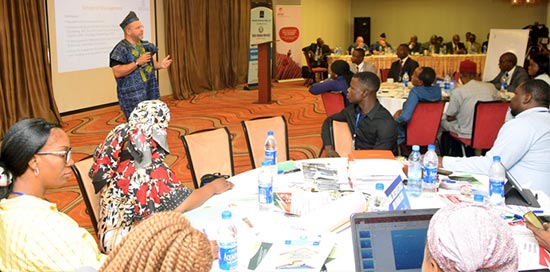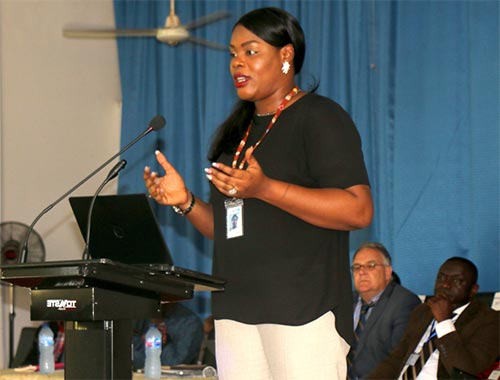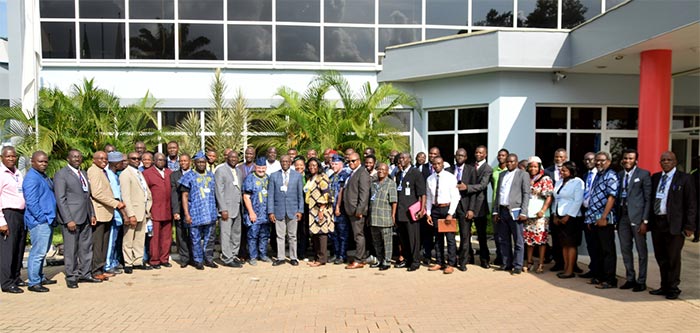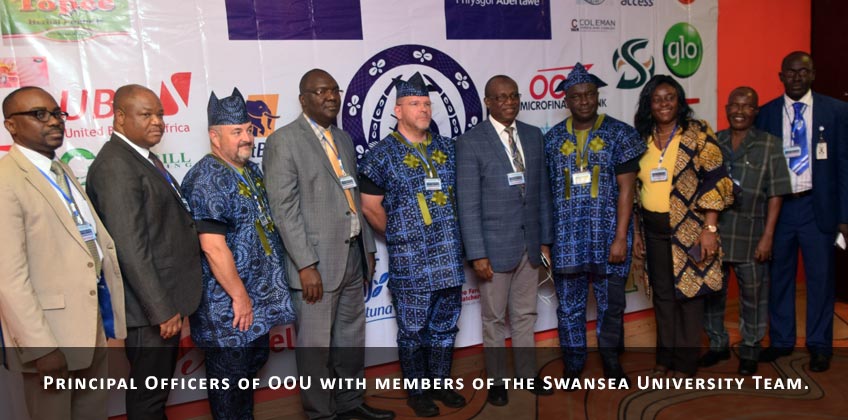Olabisi Onabanjo University (OOU), Ago-Iwoye in collaboration with Swansea University, Wales, United Kingdom have just concluded a successful International Workshop on “Improving Funding Models in Higher Education”. The event which has the British Council as the major sponsor started from Monday, 22nd July, to Thursday, 25th July, 2019 at Park Inn by Radisson, Abeokuta and Olabisi Onabanjo University, Ago-Iwoye.

In his maiden address at the Workshop, the Vice-Chancellor, Professor Ganiyu Olatunji Olatunde welcomed all the participants, especially, the team from Swansea University and the Chief Executive Officers from various industries. Giving background information on the various activities that led to the Workshop, the Vice-Chancellor informed the participants at the venue that OOU emerged the winner of a grant proposal sponsored by the British Council amongst 20 Nigerian Universities with three UK Universities as partners. “The British Council called for proposals from over 20 Nigerian universities to access grants to support Improvements in Funding and Sustainability Models in the Nigerian Higher Education sector with three UK Universities as partners. A significant number of high quality applications were received by the British Council and after rigorous selection process, our University in conjunction with Swansea University, Wales, who are the lead partner, won the grants”.

According to the Vice-Chancellor, in line with the mandate attached to the grants both Universities were expected to utilize same to support Improvements in Funding and Sustainability Models through series of activities that involved exchange of visits, holding of capacity workshops, developing new and improved sustainable funding models. He added that these could be done through business ventures, enterprise and commercialization re-engineering, enhancing entrepreneurial development of OOU graduates and relating with the industries.
Professor Olatunde revealed that a team visited Swansea University in June to understudy the best practices in enhancing funding models through entrepreneurial and business ventures activities. He added that this international programme was the next phase of the relationship which was the Capacity Building Workshop visit to OOU by the Swansea University team. The Vice-Chancellor said he expected the Workshop to improve the funding models in OOU, enhance the employability of its graduates and significantly improve the relationship between OOU and the industries by making the University more relevant to the needs of industries.
Thereafter, participants were divided into different groups such as agriculture, manufacturing, technology, ICT, health care and recycling. These various groups later went into intensive interactive sessions with the University team and the team from Swansea University getting actively involved .
Guiding this interactive session was Professor Paul Jones of the School of Business Management, University of Swansea, Wales. He was ably assisted by his colleagues which included Dr. Rhod Thomas, Dr. Alan Price and Dr. Samuel Ebie, all of School of Business Management, University of Swansea, Wales.
Earlier in his presentation, Professor Paul Jones gave a panoramic brief about Swansea University by highlighting its strengths as one of the top 3 to 10 Universities in the United Kingdom in terms of affordability, student satisfaction, graduate employability and research impact. According to him, the 120 year old University has a vibrant School of Management with strong links to industries.
He emphasized that their School of Management was able to achieve these by establishing incubation centres like “Morgan Academy” which was a research based think thank that deals with current issues of public policy and encourages critical thinking by promoting innovative evidence-based policy and the “Bevan Commission” that provides independent authoritative advice on health and care for NHS. According to the Swansea team of Professor Paul Jones, Dr. Rhod Thomas, Dr. Alan Price and Dr. Samuel Ebie, these incubation centres were funded through a “Triple Helix Collaborative Approach” that involved the academia, government and industries. Thus, Swansea University was able to attract huge and sustainable grants from the government and industries. The team explained that through the grants the University was able to solve some of the challenges faced by the industries and indeed assist the governments of Wales and the UK in their policy formulation and implementation. The team strongly believed that these types of funding models could be replicated in Nigeria by OOU.
Thereafter, the CEOs were asked “to identify the various challenges in their industries and what specifically do their organizations want from having a relationship with OOU?”
From the feedback received from many of the CEOs, it was obvious that many of the industries had challenges in the areas of specialized training, skills development, technical services, research and development. They also wanted the University’s collaboration in exchange programme, research that were tailored towards solving specific problems of industries, technical support, leadership and short management training, and most importantly, they demanded for review of the University curriculum so as to improve the employability status of OOU students.
In his response to the demands made by the CEOs, the Vice-Chancellor, Professor Ganiyu Olatunji Olatunde commended them for honouring the University’s invitation and promised that Management would address the issues raised by the entrepreneurs.
He, however, pleaded with the captains of industries to formally send their requests to the University assuring them that he would invite experts in those fields to look at the problems. He also disclosed that OOU was ready to go into alliances with the industries and assured some of them that within the next six weeks, the University would put in place the modus operandi for the collaboration to take off. Professor Olatunde disclosed that the University is opened to the suggestions for the review of its curriculum but cited the constraints of the National Universities Commission (NUC). However, he said that despite this, the University would look into how its curriculum could be reviewed within the guidelines given by the NUC. He mentioned that the institution welcomed the idea of exchange programme between industries and the University. The Vice-Chancellor said that was why the University took the Students Industrial Work Experience Scheme (SIWES) seriously by encouraging its students to spend not less than six weeks while on industrial training.

on Improving Funding Models for Higher Education
A similar round table interactive session with the Agropreneurs took place at the University Main Campus on Wednesday, July 24th. This time around, the programme initiator and major sponsor, the British Council, Nigeria, the UK International Organization for cultural relations and educational opportunities was well represented by Mrs. Ogochukwu Iwuora. While delivering her address at the session, Mrs. Iwuora informed the participants that British Council would be celebrating its 75th year of existence in Nigeria. According to her, the partnership between Swansea University and OOU which was aimed to develop a revised funding model for OOU was one of the British Council’s International Higher Education partnership activities. She stated that the idea of improving funding models in higher education was an outcome of the Higher Education dialogue facilitated by her organization in November last year following a resolution reached from the” “2018 Going Global Cascade Workshop” held in July.
According to the British Council’s representative, Going Global Cascade “is a discursive platform facilitated by the British Council, Nigeria in partnership with the National Universities Commission (NUC) to support the cascade of the knowledge and learning from the Going Global Conference to a broader based audience”
She added that the Workshop examined topical issues that were relevant to Nigeria Higher Education Sector. Based on this, a decision was taken to focus this year’s Higher Education dialogues on sustainable funding streams for Higher Education institutions and enhancing employer- academia relationships. Mrs. Ogochukwu Iwuora said that this led the British Council to invite Universities in Nigeria to submit partnership grant proposals on improving funding models in Higher Education. “The British Council was happy to select two successful partnerships out of 20 partnership grant proposals that were submitted”.
“Swansea and OOU partnership are part of the two and we are happy with the progress made so far. It is our sincere hope that both Universities found this exercise beneficial and we look forward to seeing memorandum of understanding between OOU and the CEOs” said, Mrs. Iwuora. She disclosed that the British Council planned to distill the activities from these projects into reports which would be shared and disseminated to Higher Education leaders and policy makers with the aim of building wider sector knowledge through multiplier effect.
Earlier on Tuesday, 23rd July, there was a special session on Train the Trainers. This involved the training of selected potential trainers drawn across the Faculties and Colleges. The Swansea team were also on hand to train these potential trainers, who were likely to form the cluster team that would drive the outcome of the workshop. Study on how to improve funding models, private sector involvement in curriculum development, entrepreneurship, research and development skills in the University were extensively examined and discussed in depth. Wednesday, 24th afforded the Swansea team to have a tour of the Main Campus of the University. They were at the University ICT Centre, the new Administrative Building, University Library and the OOU Radio Station.
At the close of the Workshop session, the two teams met at the Vice-Chancellor’s office to do a quick review of the entire activities that took place during the week and distill them into a working document, with the Vice-Chancellor, Professor Ganiyu Olatunji Olatunde presiding over the mini-session. It was a consensus by the two partners that a meaningful and sustainable structure should be put in place by the University. The structure, according to the Vice-Chancellor, would handle the outcome of the Workshop and probably be domiciled in the Linkages and Research Directorate of the University. The Vice-Chancellor added that the structure will have an Incubation Centre such as Employability and Data gathering Units.
Professor Olatunde also emphasized that a Curriculum Review Workshop would soon take place in the University. He stated that the University might not alter its entire curriculum but there would be some fine-tuning of its contents to enhance the employability status of its students and bridge the existing skills gaps between the companies and the University.
He promised that the University will liaise with the industries and align its curriculum to their demands.
It was also the consensus among the collaborative partners that there should be a joint publication on the outcome of the Workshop to be followed with a well packaged document that could be presented to the British Council. At the end of the day, both parties were excited that the one week international workshop on improving funding models in higher education was a huge success.


